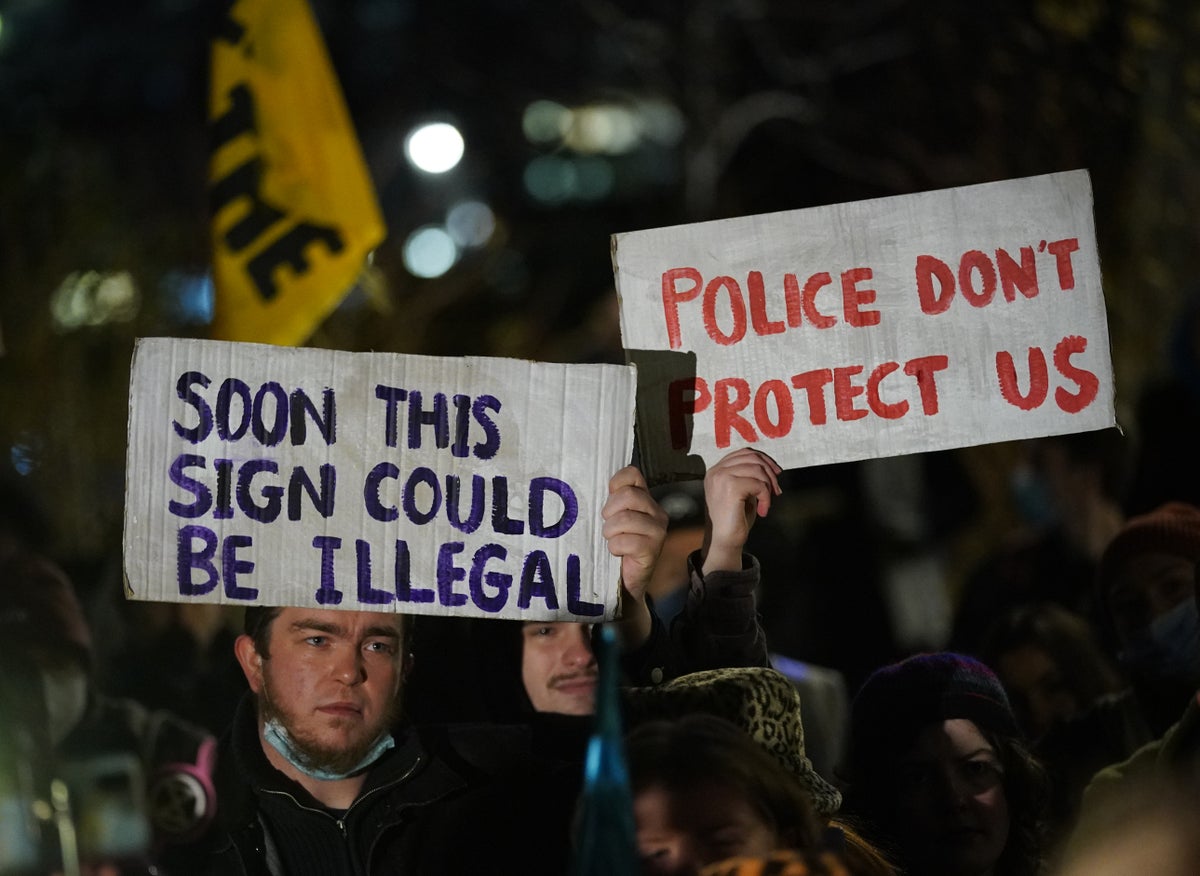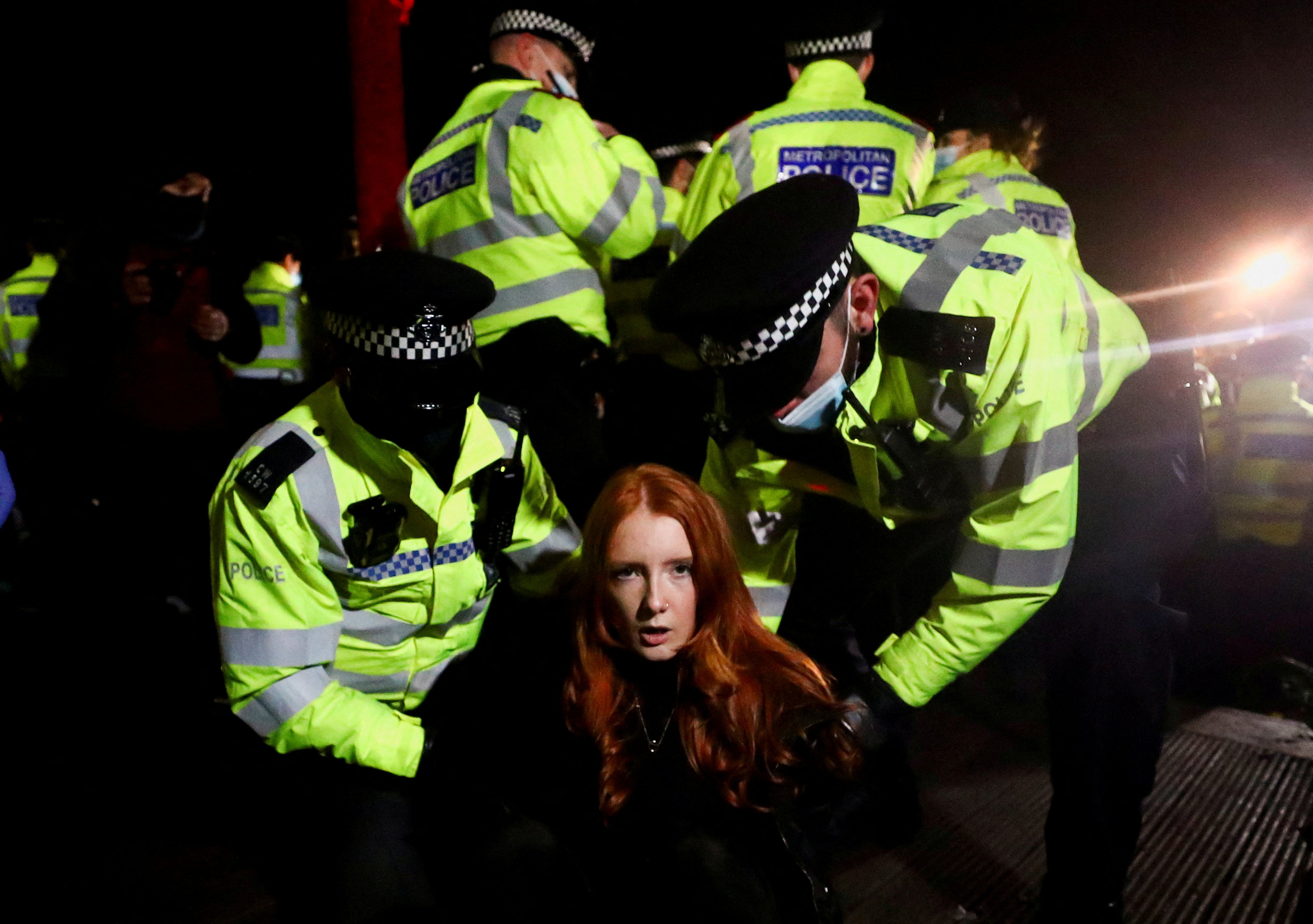
Female protesters have raised fears the policing bill will increase officer violence towards them, warning the legislation could embolden some police officers to be more misogynistic and racist.
Campaigners told The Independent it is worrying that the controversial legislation was rolled out even when officers were being criticised for failing to stop violence against women in their own ranks.
The policing act, which became law in April, has been widely criticised by campaign groups. Opponents to it warn that the legislation cracks down on citizens’ right to protest and exacerbates over-policing and the criminalisation of marginalised communities.
“The issue is that women have always relied on protests and demonstrations to further our rights and are also more at risk of excesses of police powers,” Silkie Carlo, director of Big Brother Watch, a leading civil liberties campaign group, told The Independent.
Ms Carlo said the policing bill was introduced against the “backdrop of very well-documented abuses of police powers” and “police violence against women”. The legislation is particularly worrying given the next few years will see increasing protests and unrest over the cost of living crisis, as well as environmental and social justice campaigns, she said.
“The prosecutions of women at the vigil for Sarah Everard are such a clear example of how – even before the policing bill – women can so easily be prosecuted for protest”, Ms Carlo added.
Patsy Stevenson, whose photo went viral after her arrest at a vigil for Sarah Everard, told The Independent the policing bill removes citizens’ “human rights” and “freedom of expression”.
The 29-year-old was pinned to the ground by police while she was being arrested at the vigil in Clapham in south London in March last year to remember Everard, who was kidnapped, raped and murdered by serving Met Police officer Wayne Couzens.
Ms Carlo said: “The bill is a protest crackdown bill. It can make almost any regular protest and demonstration illegal. A lot of people will enter into protest situations with anxiety. If the police want to arrest them, there is a possibility that might happen – they might be deemed to be making too much noise or disruption.”
According to the government, the bill will “strengthen police powers to tackle non-violent protests that have a significant disruptive effect on the public or on access to parliament”.
The Police Bill Alliance, a coalition of more than 350 organisations that are against the legislation, referred to the legislation passing the last parliamentary hurdle as “a dark day for democracy”. Meanwhile, Liberty, a human rights charity, branded the policing bill as “discriminatory and authoritarian”.
Police have been given more powers to shut down peaceful but “noisy” protests under the legislation, as well as keep tabs on activists and criminalise them. However, the Lords put forward a slew of amendments culling some of the most fiercely criticised anti-protest elements in the legislation.
“Protesters are supposed to be disruptive and noisy. Even if we did a peaceful protest, the bill gives police the right to decide whether they deem it lawful or not,” Ms Stevenson, who launched legal action against the police, said.

“What do we do if we stop fighting for our human rights?” she added. “It becomes a dictatorship. Before this bill was in place, the police abused their powers and made unlawful arrests. The police were sexist, racist, misogynist and transphobic”.
Ms Stevenson, a physics student, said police officers recognise her at protests. “They look to their other police mates and point me out,” she added. “I think they are a bit too scared to say something untoward or be heavy-handed with me as they know there is the potentiality for me to sue them.”
And Andrea Simon, director of End Violence Against Women Coalition, told The Independent that “protest is a feminist issue”. She said it is “firmly embedded in the struggle for women’s rights – and particularly the rights of Black and minoritised women”.
Ms Simon added that recent years have shown how instrumental protest is “in the face of endemic violence against women, to gather together and to collectively demand change”.
Cristel Amiss, a lifelong women’s rights activist, said: “The government’s response to mass outpourings – highlighting years of impunity for police violence, corruption and illegality – is the Police Act and other repressive legislation giving them even more power to abuse.”
Meanwhile, a spokesperson for the National Police Chiefs’ Council told The Independent that “misogynistic, racist or disrespectful” views and actions within society are mirrored in policing. “It matters more in policing because we hold intrusive powers, and our legitimacy is built on public confidence,” the representative said.
”Forces are responding unequivocally to allegations of police-perpetrated abuse including an urgent review of all current allegations of sexual misconduct, domestic abuse and other violence against women and girls related offences against officers and staff, ensuring that they are being investigated fully and quickly,” they added.
But they defended the bill, saying: “The new measures tackle the selfish minority of protesters who are highly disruptive and whose actions endanger the public, such as those who block ambulances from reaching hospitals or prevent hundreds of people getting to work.”
A Home Office spokesperson said the claims in this article are “completely unfounded”. While the “freedom to protest” is a key right, the Police Crime Sentencing and Courts Act was needed as “the laws to manage highly disruptive protests” are outdated, they said.







